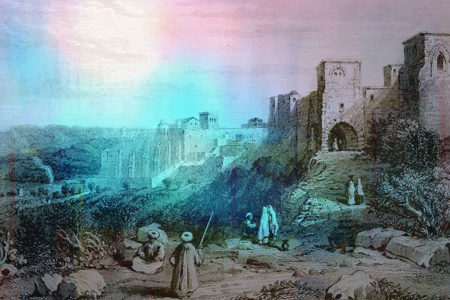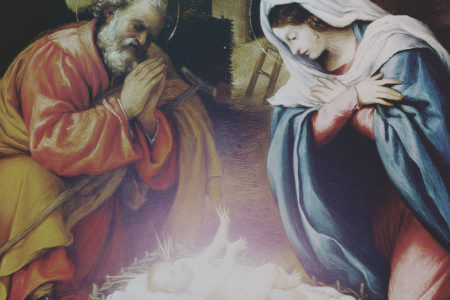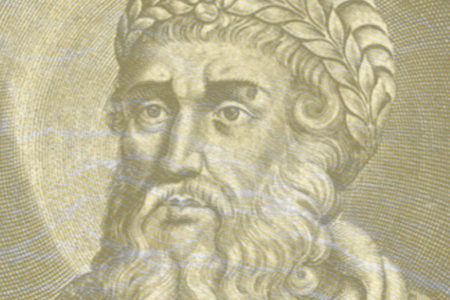A Night in the Fields
The King is born! And who receives the birth announcement? Not the people you might think.
Birth announcements are exciting. Parents share the news first with family, then with close friends, and later with the community. In the first century, however, it was unthinkable to send birth announcements to the poor and to those who held lower-class occupations, like shepherds, because such people were often considered outcasts in society.
But God does things differently than man. God bypassed the priests, scribes, and men of wealth and stature to announce Jesus the Messiah’s birth to common shepherds.
The angels must have been amazed beyond words when they witnessed the Creator of the universe being born as a baby (cf. Col. 1:16–17; 1 Tim. 3:16). But they must have been even more surprised God asked them to announce the birth to lowly shepherds (cf. Isa. 55:9).
THE SHEPHERDS
The Gospel writer Luke wrote, “Now there were in the same country shepherds living out in the fields, keeping watch over their flock by night” (Lk. 2:8). Though the Bible does not date this event, shepherds in Bethlehem guarded their sheep in the fields day and night from March to November. They lived outside, protecting the flocks from wild animals and poachers. Some scholars speculate the sheep these particular shepherds watched were reserved for Temple sacrifices, but the text does not indicate the sheep’s use or destination.
SKETCHES OF JEWISH SOCIAL LIFE
Find out more about shepherds’ social status and their importance in Jesus’ birth in Sketches of Jewish Social Life by Alfred Edersheim.
Society and rabbinic Jews despised shepherding and looked at shepherds with disdain, just as the Egyptians did in Joseph’s day (cf. Gen. 46:34). People considered shepherds heathen, did not allow them to serve as court witnesses, and refused to give them charity. They were often considered to be thieves, dishonest and untrustworthy, and were under a rabbinic ban because they also were considered ceremonially unclean. Such attitudes developed because shepherds were uneducated (especially in the Mosaic Law) and were therefore deemed a lower class of Israelite.
But this view is not scriptural. In fact, Scripture speaks favorably of shepherds and presents them as humble people. Abraham, Moses, David, and Amos were all shepherds; and Scripture calls the Lord Jesus Christ our “good shepherd,” the “great Shepherd,” and the “Chief Shepherd” (Jn. 10:11; Heb. 13:20; 1 Pet. 5:4).
On the night of Jesus’ birth, an angel suddenly appeared to the shepherds, and they were immediately terrified: “And behold, an angel of the Lord stood before them, and the glory of the Lord shone around them, and they were greatly afraid” (Lk. 2:9). This was a startling, unsettling fear, similar to what Zacharias and Mary experienced when an angel appeared to them (1:12, 29).
Scripture doesn’t identify the angel the shepherds saw. (The angel Gabriel appeared to Mary and Joseph.) With the angel’s appearance came a bright presence of glory that surrounded the shepherds, and “a multitude of the heavenly host” joined the angel in praising God (2:13–14).
THE PRONOUNCEMENTS
The angel made several pronouncements to the shepherds:
First, he addressed the shepherds’ fear: “Then the angel said to them, ‘Do not be afraid, for behold, I bring you good tidings of great joy which will be to all people’” (v. 10). The angel immediately wanted to calm and comfort the shepherds, since fear always accompanied such shocking angelic appearances (cf. 1:13, 30; 5:10). But the shepherds probably continued to tremble from the experience.
The angel said he came to announce “good tidings,” which means good news. He also said the message would bring “great joy” (since Jesus the Messiah brings fullness of joy to those who accept Him; Jn. 15:11; 16:24; 1 Jn. 1:4) and that the message was specifically for Israel (Jesus is Israel’s promised Messiah) but also was meant for “all people” throughout the world.
Second, the angel announced the Savior’s birth: “For there is born to you this day in the city of David a Savior, who is Christ the Lord” (Lk. 2:11). He said the Savior’s birthplace was the “city of David, which is called Bethlehem” (v. 4; cf. Mic. 5:2).
He also spoke of Christ’s preeminence, calling Him the “Savior, who is Christ the Lord” (Lk. 2:11). Jesus’ three titles—Christ, Savior, and Lord—appear together here.
The word Savior speaks of Christ’s ability to deliver, or rescue, both Jewish people and Gentiles physically and spiritually through Jesus’ foreordained death on the cross for humanity’s sin. Christ’s atoning work applies to all who receive Him personally as Savior and Lord.
The word Christ (Messiah) refers to His Messianic office as the anointed King of Israel who will sit on the throne of His ancestor King David and reign over the house of Jacob forever. His Kingdom will never end (cf. 1:32–33).
The word Lord speaks of His rank as “LORD OF LORDS” (Rev. 19:16) and refers to His absolute sovereignty and divine authority over everything in the universe.
Third, the angel revealed the sign of Christ’s birth: “And this will be the sign to you: You will find a Babe wrapped in swaddling cloths, lying in a manger” (Lk. 2:12). He directed the shepherds to a place of humble surroundings where they did not see a magnificently arrayed infant-king but, rather, a mere baby in an animal stable wrapped in nondescript “swaddling cloths” (narrow strips of material wrapped around infants to restrict movement)—hardly the garments of a prince or king.
Nor did Jesus lie in a crib fit for a king. He lay in a manger, an animal feeding trough. It was an unclean place, hardly fit for a newborn baby, let alone the Messiah. But Jesus’ humble birth mirrored His entire life on Earth. Though He was a king, He came as a servant:
Let this mind be in you which was also in Christ Jesus, who, being in the form of God, did not consider it robbery to be equal with God, but made Himself of no reputation, taking the form of a bondservant, and coming in the likeness of men. And being found in appearance as a man, He humbled Himself and became obedient to the point of death, even the death of the cross (Phil. 2:5–8).
From birth to death on a cross between two thieves, Christ’s life demonstrated humility (cf. Mt. 27:38; Lk. 9:58; 2 Cor. 8:9).
The angel’s announcement concluded with a choir of angels: “And suddenly there was with the angel a multitude of the heavenly host praising God and saying: ‘Glory to God in the highest, and on earth peace, goodwill toward men!’ [men of His good pleasure]” (Lk. 2:13–14).
Scripture doesn’t indicate the praise included musical accompaniment or that the angels hovered over the shepherds; but the praise, though short, was extremely significant. The angels (1) praised God and (2) bestowed “peace, goodwill toward men.”
Their words, glory to God in the highest, offered God praise in the highest place (heaven), as contrasted to Earth where humans were to receive God’s peace. God deserved praise for bestowing His love, mercy, and grace on sinful men by sending Jesus to provide salvation. Thus heaven praised God for the salvation that made it possible for people to be saved; experience reconciliation with God; and receive the peace that is of, with, and from God.
THE SEARCH
After the angels departed, the shepherds discussed the unusual revelation and departed for nearby Bethlehem to find the Messiah:
So it was, when the angels had gone away from them into heaven, that the shepherds said to one another, “Let us now go to Bethlehem and see this thing that has come to pass, which the Lord has made known to us.” And they came with haste and found Mary and Joseph, and the Babe lying in a manger (vv. 15–16).
Notice the passage mentions Mary before Joseph, probably because she was the focus of this account and gave birth to Jesus, as the angel Gabriel had prophesied (1:26–57; 2:1–7).
When the shepherds arrived in Bethlehem, they knew what to look for: a newborn wrapped in swaddling cloths and lying in an animal feeding trough. And that was what they found (2:12). This confirmation sealed their faith that Jesus was the promised Messiah whom God had sent for the salvation of Israel and the world.
THE SHARING
Then the shepherds “made widely known the saying which was told them concerning this Child” (v. 17). Though they held a pitifully low social status in Israel, they became the first preachers of the Messiah by simply relaying to people what they had seen and heard.
People responded to the shepherds’ message with wonder: “And all those who heard it marveled at those things which were told them by the shepherds” (v. 18). The fact they marveled does not mean they came to faith, but it means they expressed surprise at what the shepherds had revealed.
Mary’s response was quite different: “Mary kept all these things and pondered them in her heart” (v. 19). The word kept means to guard. Mary guarded and treasured what had happened to her—Gabriel’s revelation, the shepherds’ visit, and the birth of Jesus. She probably scrutinized every detail. The word pondered means Mary weighed, compared, and continually contemplated every moment of her entire experience.
Then the shepherds “returned, glorifying and praising God for all the things that they had heard and seen, as it was told them” (v. 20). They returned to Jerusalem full of joy, “glorifying and praising God,” full of renewed faith. God had blessed them with the extraordinary privilege of being the first to witness the beginning of a new work through Jesus the Messiah.









Were sheep really kept in the fields day and night ? Were they not put into a shelter during the night?
Mr. Levy,
I’m presently putting together a powerpoint for a test class. The instructors are testing my teaching ability so I decided on the topic of “can we determine When Jesus was born?” From the account in Luke about Zechariah seems to be the only way to actually pinpoint the date or to at least get close. Since he priestly order was Abijah and that was the 8th in line of service, it would make sense that if we can figure out which of the two times of year his order served then we might be able to have a better idea of when Christ was born. My guess would be that it can only be one of two times. Either early fall or early spring. Ive checked some commentaries and also some resources online and everyone seems to have their own spin. I think it might be helpful if some light was shone on the passage “…the Shepards were living in the fields watching their sheep at night…” Can you shed some light on that passage? Were the Shepards watching their sheep in the fields at night because it was lamb birthing season in Bethlehem or it is something they always did instead of bringing them back to the sheep pen after spending the day in the fields? I will be sharing my info in hopes of starting a conversation with unsuspecting teachers who think they are just there to see if I am able to teach. Thank you so much for your time.
Sincerely,
Michael Calderone
Listen to Rabi Jonathan Cahn on youtube. “Was Christ born on Christmas ”
Let me know what you think.
Very helpful article on the shepherds abiding in the fields at night.
Well written, Mr. Levy. You never fail to bring the scriptures to life.
THIS IS A BEAUTIFUL STORY OF CHRIST OUR LORD, AND THE STORY BRINGS JOY AND HAPPINESS WITH IT BEING RETOLD OVER AN OVER AGAIN. THIS BRINGS A PEACE OVER MY SOUL, AND RAISES MY SPIRIT, OF HOW HUMBLE THE BEGINNINGS OF OUR SAVIOR AND CHRIST OUR LORD. MAY GOD BLESS ALL MEN AND WOMEN OF THIS EARTH, AND BRING PEACE AND GOODWILL TO EVERYONE, AMEN.